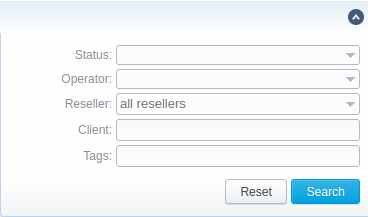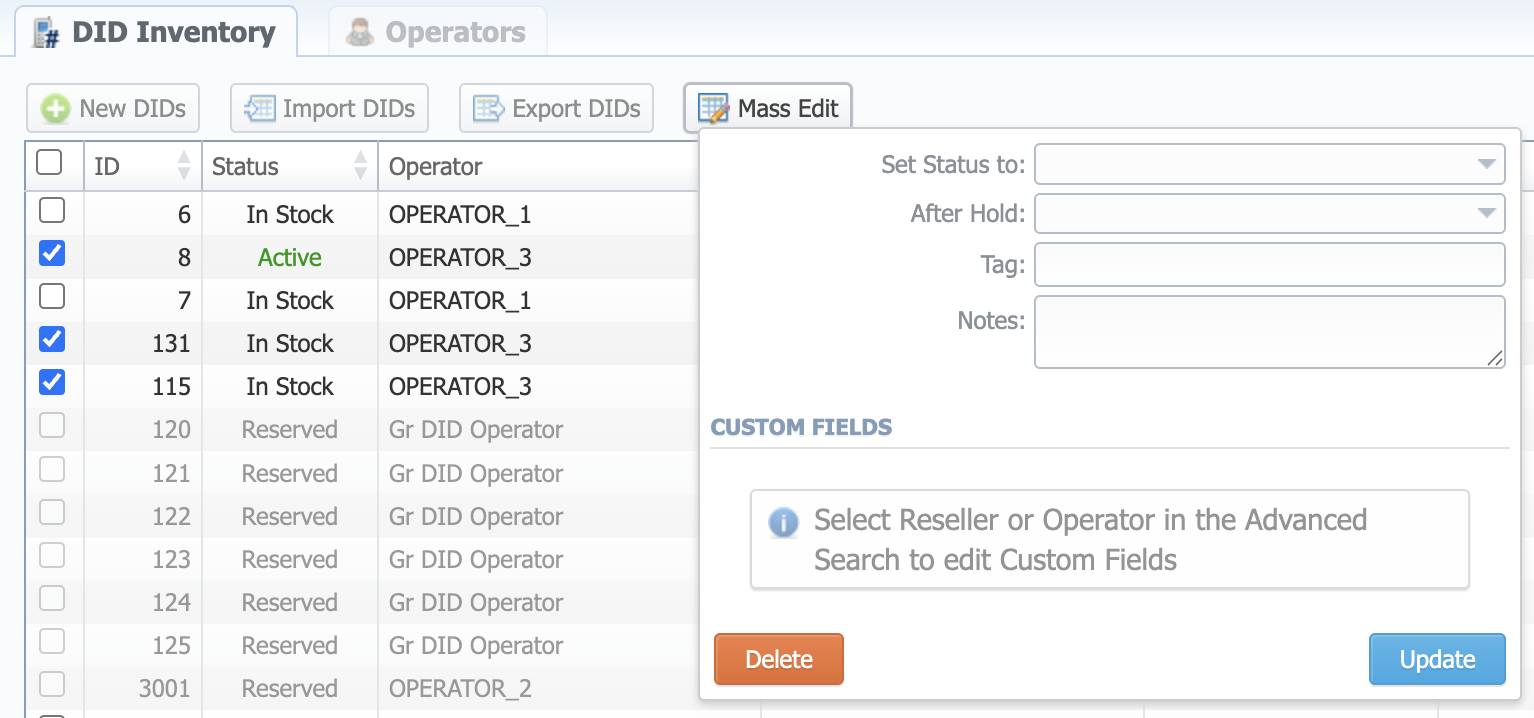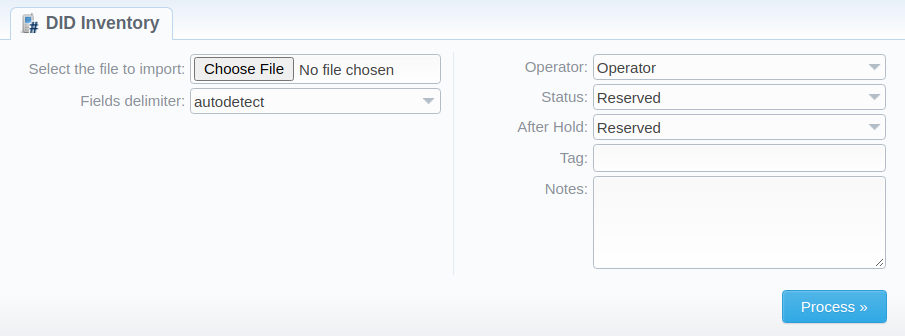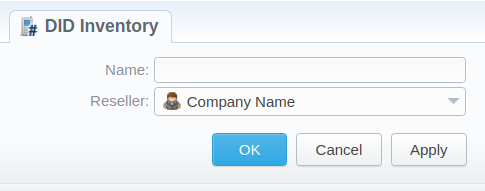DID Inventory
Section overview
This section allows creating the DID numbers, which later may be assigned to one of the packages and finally provided to a customer under the Package terms. The section consists of two tabs:
- DID inventory
- Operators
DID Inventory tab
The tab contains a list of all existing DID(s) and is presented in the form of a table with the following columns:

| Column | Description |
|---|---|
| ID | ID of a current DID number |
| Status | Status of a current DID number ("active", "in stock", "reserved", "oh hold", "block", "archive") |
| Operator | Current DID's operator, an owner of a current DID number |
| DID | Current DID number |
| Tag | Specify the tag for a respective DID number you would like to be tagged in the future |
| Notes | Additional information about a certain DID |
| Client | Shows the client and account, which a current DID belongs to |
| Reseller | Name of a reseller, under which the respective DID's operator was created |
Functional buttons, presented in the tab are as follows:
| Button/Icon | Description |
|---|---|
 | Allows creating a new DID(s) |
 | Allows importing DIDs from .csv or .xls files |
 | Allows exporting currently displayed DIDs in a .csv file |
 | Allows editing the selected DIDs |
 | Allows viewing history of DID changes in the Audit Log section |
 | Allows deleting a DID from the system |
DID lifecycle
The system manages the lifecycle of DIDs through a set of statuses. The lifecycle follows a predefined flow, but you can configure certain aspects, such as timing and transitions, to align with your business processes.
DID statuses
| Status | Description |
|---|---|
| Reserved | DID is not yet available for purchase. |
| In stock | DID is available for purchase and assignment. |
| Active | DID is assigned to a customer and in use. |
| Blocked | DID is assigned to a customer but temporarily restricted from use. |
| On Hold | DID is in a cooldown period after being used, before reassignment. |
| Archive | DID is no longer available for use or reassignment. |
DID lifecycle and subscription control
The overall lifecycle of a DID is determined by the customer’s Subscription (Package). The key lifecycle stages are:
- Introduction to the system
- When a DID is first added, it is either Reserved or In Stock.
- Assignment and activation
- When a customer has an active subscription that allows DID allocation, a DID can be assigned to them.
- Once assigned, the DID becomes Active.
- Subscription cancellation or expiry
- If the customer's subscription is canceled (voluntarily or due to non-payment), the DID moves to On Hold for a predefined period.
- The period for cooldown can be configured in the Package settings.
- Subscription reactivation
- If the customer reactivates their subscription during the hold period, the DID becomes Active again.
- End of hold period
- If the DID remains On Hold beyond the pre-configured duration, it transitions to the next defined status—either In Stock, Reserved, or Archived, based on the DID settings.
This structured lifecycle prevents immediate reassignment of DIDs, ensuring better inventory control and alignment with subscription management.
When a subscription with the assigned DID number is not active, this DID number will be on hold and a routing destination will be unreachable.
Advanced search
In the top right corner of the section above the table, the advanced search drop-down menu is located. To filter section data, fill in the following drop-down menu and press Search:

Creating a DID number
The whole process of creating a DID number can be described in a few steps:
- Go to the Retail → DID inventory → Operators tab. Create one or more operators (DID providers).
- Open the DID inventory tab, add one or more DID numbers. Make sure that these DIDs have the "in stock" status. You can also use the Import DIDs button.
| Field | Description |
|---|---|
| DID(s) | Indicate one or multiple DID numbers |
| Operator | Specify a target DID provider |
| Status | Choose one of the statuses a DID can acquire: "reserved", "in stock", or "archive" |
| After hold | Define what status a DID is going to acquire after being in hold status. The Hold status is acquired after Package, this DID is assigned to, is deactivated |
| Tag | Specify an additional tag for better division of DIDs in certain groups. Useful when clients have multiple DIDs |
| Notes | Define additional info regarding DIDs |
Also, you can set the range of DID numbers in the DID(s) field.
Specify the range using the upper and lower numbers and the dash "-" to separate them. For example, "111-222". Therefore, the system will create a range of DIDs from "111" to "222" (included).
- Go to the Retail → Packages section. Create a package, where a number of allowed DID's to be picked from will be specified.
- Assign a respective Package to a target customer in the Subscriptions section.
- Open the DIDs tab in the target client settings. Here, pick one or more DID numbers to assign.
For more details, look through the How to configure DIDs scheme article in our Knowledge Base. This will effectively assign a DID number to one of the customer's accounts. Please note, this functionality is very switch-dependent, and additional development or testing may be required. Please contact JeraSoft Support team for help, if you have any doubts or questions.
We recommend using tags to make navigation between a great deal of DIDs easier and more effective.
Mass edit of DIDs
You easily can change the status of multiple selected DIDs, specify tags and a number of hold days, or change Custom Fields using the Mass Edit button.
To do so, you need to select/filter the DIDs, then click the Mass Edit button, and specify your changes in a pop-up window. Then, click the "Update" button to confirm the change. If you click the "Delete" button, only selected DIDs will be deleted.

DIDs importing
The process of DIDs importing is pretty simple:
- Click the Import DIDs button
- In a pop-up window, you need to attach a .csv file you wish to be imported and fill in the respective fields
- Click the Process>> button
- Specify columns names from a drop-down list, and once again click Process>>
All imported DIDs will be displayed in a section table:

DIDs exporting
DIDs export allows a user to download a .csv file that contains information currently displayed in a section table. Apart from all the columns, the file contains an extra Package column, where a respective package name, if any of the DIDs is assigned to the package, will be displayed.

Operators tab
This section shows the list of operators who are owners of DID numbers. The tab is presented in the form of a table with the following columns:

| Column | Description |
|---|---|
| ID | ID of an operator |
| Name | Operator's name |
| DID's count | The amount of DID numbers owned by the current operator |
| Reseller | Current operators' reseller |
The functional buttons/icons in the tab are:
| Button/Icon | Description |
|---|---|
 | Allows creating a new operator |
| Allows filtering DID numbers in the DID Inventory tab by a target operator | |
 | Allows deleting a respective operator |
You can filter tab data by Resellers using Advanced search in the top right corner of the page.
Creating a new Operator
To add a new operator, click on the New Operator button and specify an operator's name and target reseller in the pop-up window. Then, click OK for confirmation.
